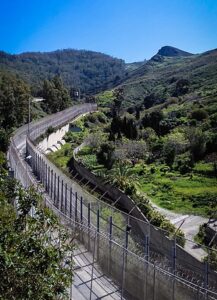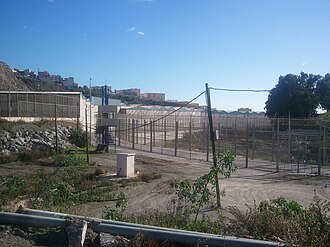Urban Borderlands
Anna Tybinko is a Collaborative Humanities Postdoctoral Program Fellow with the Department of Spanish & Portuguese.
Slicing through the hillsides of North Africa there are two enormous, steel mesh barriers that divide the autonomous Spanish cities of Ceuta and Melilla (often referred to as enclaves) from Moroccan territory. These double-facing fences, or vallas, are nearly twenty feet high and crowned on the top with razor-wire. Along with the Guardia Civil patrolling the Spanish side, thermal cameras and motion sensors lend a distinctly prison-like feel to the entire operation. Even though Spain and Morocco are on amicable terms, these heightened surveillance measures now make for one of the world’s most militarized borders.
That wasn’t always the case.

In 1985, Spain passed its very first unified immigration law: the Ley Orgánica 7/1985, de 1 de julio, sobre derechos y libertades de los extranjero en España or LOE. This piece of legislation was considered a prerequisite for Spain’s admission to the European Economic Community after years of isolation under the dictatorship of Francisco Franco (1939-1975). It thereby marked a watershed moment in Spain’s transformation from a long-standing country of émigrés into a popular destination for international migration. With the formation of the European Union in 1993, Ceuta and Melilla became the new European conglomerate’s only terrestrial border with Africa practically overnight, and this formerly dusty frontier zone was converted into the veritable face of “Fortress Europe.” My research asks: what impact did these physical bordering efforts have on Spanish society, and more specifically Spanish cities?
Until now, this research question has only been addressed through the fields of sociology and anthropology, whereas I build upon my prior training in the social sciences to craft a new analytic for a burgeoning body of literature typically labeled as “migrant narrative.” To that end, my book project Urban Borderlands: Contesting Racial Boundaries in Contemporary Spain amplifies the voices of a group of African-born authors who publish for a Spanish audience and positioning their narratives of migration as central to understanding the country’s current cultural and economic panorama.
Sociological perspectives maintain that immigration became a “social issue” in the 1990s, as Spaniards grappled with integration in the face of increasingly heterogeneous arrivals (Aja, Cachón, Carrera). Anthropologists re-conceptualize these—often racially-motivated—reactions in terms of the erection of new social boundaries (Suárez Návaz, Soto Bermant). These ethnographies examine Spanish/African relations in rural areas, amongst agricultural workers, and in Spain’s frontier zone with Morocco, whereas the narratives brought together in Urban Borderlands stand as the only form of testimony to the simultaneous bordering of Spanish cities.

The book draws writers of Moroccan descent such as Najat El Hachmi and Safia El Aaddam, into conversation such voices as Agnès Agboton originally from Benin, or Donato Ndongo-Bidyogo and Juan Tomás Avila Laurel from Equatorial Guinea, Spain’s only former sub-Saharan colony. Through their creative expression—and through one-on-one interviews with these authors—I interrogate how Spain’s urban space was quickly divided along racial and ethnic lines in reaction to the LOE. By approaching this corpus through a Border Studies lens, I push back against the existing comparative framework that creates a false dichotomy between “Spanish” and “migrant” authorship. Rather than treat them as outsiders, I position these authors as authorities who write from the Spanish borderlands. Through their collective storytelling effort, I foreground Spain’s historically contentious relationship with its African neighbors as crucial for understanding how anti-Black sentiment undergirds contemporary bordering efforts worldwide.
 Anna Tybinko (Spanish and Portuguese) investigates race, racialization, and “bordering” in Spanish cities and specializes in migration and border Studies in the Iberian world. Her book project is titled Urban Borderlands: Contesting Racial Boundaries in Contemporary Spain. Anna was the John Hope Franklin Postdoctoral Research Associate in the Franklin Humanities Institute’s From Slavery to Freedom Lab at Duke University. Her work has been supported by the National Endowments for Humanities, Andrew W. Mellon Foundation, and American Council for Learned Societies. She received her PhD in Romance Studies at Duke University.
Anna Tybinko (Spanish and Portuguese) investigates race, racialization, and “bordering” in Spanish cities and specializes in migration and border Studies in the Iberian world. Her book project is titled Urban Borderlands: Contesting Racial Boundaries in Contemporary Spain. Anna was the John Hope Franklin Postdoctoral Research Associate in the Franklin Humanities Institute’s From Slavery to Freedom Lab at Duke University. Her work has been supported by the National Endowments for Humanities, Andrew W. Mellon Foundation, and American Council for Learned Societies. She received her PhD in Romance Studies at Duke University.